Selected Radio Reports & Documentaries from around the World by Kyle G. Brown
CHILE: STRUGGLING TO EMERGE FROM 50 YEARS OF NEOLIBERALISM
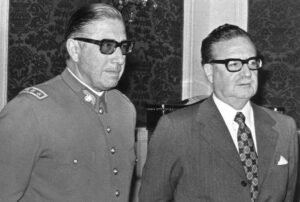
(Photo by AFP)
September 2023 marked the 50th anniversary of a bloody coup d’etat that toppled Chile’s socialist government in 1973. Led by General Augusto Pinochet, the military dictatorship that took power killed or “disappeared” more than 3,000 people over the next 17 years.
What is less well-known, is that ousted President Salvador Allende’s ambitious socialist programme was replaced by one of the earliest and most expansive neo-liberal experiments in the world.
“The neo-liberal policy starting in 1974 and ’75 could not have been carried out in Chile without a dictatorship,” said Raúl González, an economics professor at the Academic University of Christian Humanism in Santiago. “And this was due to the influence of a group called the ‘Chicago Boys.'”
Listen to this hour-long radio documentary, which aired October 16, 2023on CBC’s Ideas programme.
CANADA’S SLAVERY SECRET
It’s common knowledge that runaway slaves found refuge in Canada. But few know that Africans and Indigenous peoples were bought, sold and exploited, right here, too. I investigate why slavery was allowed to continue for some 200 years, and yet be one of the least talked about aspects of our history.
Part I: The whitewashing of 200 years of enslavement
 Part One aired on CBC Radio’s IDEAS programme on June 28, 2018. It was the show’s most listened to episode of the year, and won an RTDNA award in 2019.
Part One aired on CBC Radio’s IDEAS programme on June 28, 2018. It was the show’s most listened to episode of the year, and won an RTDNA award in 2019.
Part II: Slavery’s long shadow
The impact of 200 years enslavement in Canada
Is there a connection between the enslavement of African-Canadians and their overwhelming presence in the criminal justice system today? The United Nations has sounded the alarm on anti-black racism in Canada, stating it can be traced back to slavery and its legacy.
In Part 2 of this series on slavery in colonial Canada for CBC’s IDEAS programme, we explore the long-lasting ramifications of one of humanity’s most iniquitous institutions.
THE INVISIBLE PIRATES
Kenyan environmental groups and local fishermen say they are finding dead fish washed ashore, habitats damaged and equipment destroyed.
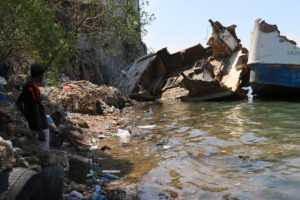
So-called ‘Phantom ships’ have been entering into East African countries’ territorial waters unannounced, and leaving with more than they declare.
Kenyan authorities have long lacked the means to do much about illegal fishing, but they hope a series of new measures will help them put an end to what is described as piracy and pillaging.
Click to listen to the first of three RFI radio reports.
Listen to Part II on how industrial fishers cook the books and under-report their catch.
In Part III, I board Greenpeace’s “Esperanza”, which tracks illegal fishers along the West African coast.
FISHERMEN TRY to FLEE FORCED LABOUR
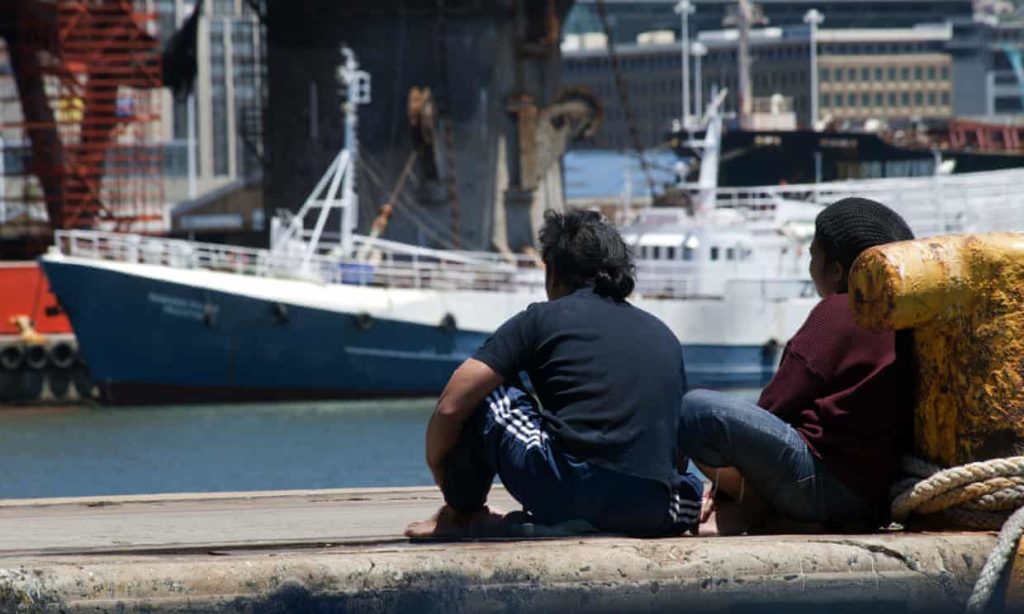
Rodger Bosch AFP/Getty
Cape Town, one of Africa’s busiest ports, receives all kinds of foreign vessels every day – from cargo ships to fishing boats. But increasingly, the small team that takes care of seafarers when they arrive, finds it is dealing with serious human rights abuses. Fishermen – mainly from Indonesia and the Philippines, complain of insufficient food and water; having to work up to 22-hour days, and suffering injuries which often go untreated.
This report aired on BBC World Service in August, 2016.
Read also: Bid for Freedom – Rescuing Trafficked fishermen as they dock in Cape Town
RADICAL WAY TO HOUSE THE HOMELESS
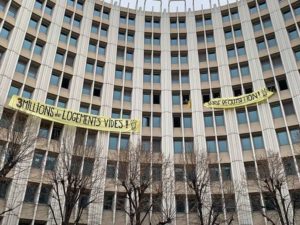
In a brazen move to help homeless families endure the cold winter, activists have taken over empty Paris office buildings and moved dozens of people in. Property-owners are alarmed. But the government’s response has been surprising. Listen to the CBC News Report.
DRAFTED BY A DICTATOR
Chile’s late dictator Augusto Pinochet took power in a violent coup d’état in 1973.

For some, it is hard to believe that the men who were conscripted to carry out his often bloody orders are now campaigning for compensation, 40 years on. They were forced they say, to commit heinous acts from which some have never managed to recover. They too, were victims of Chile’s coup.
In this CBC documentary which aired in January 2014, we hear from ex-conscripts and Chilean families who lost loved ones under the brutal dictatorship. We hear how the country is still struggling to heal from Pinochet’s legacy, and still trying to sort out who the real victims are.
Read: Were Chile’s Soldiers Victims Too?
ROUNDED UP and RUN out of TOWN
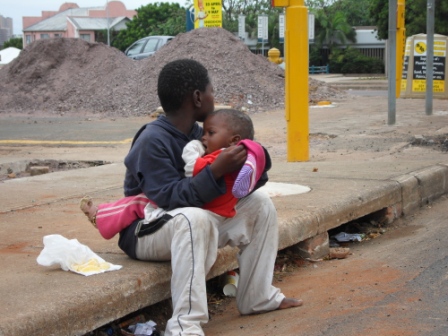
What most soccer fans didn’t see during the World Cup were the many children that live in the streets of South Africa’s cities. That’s because they’ve been rounded up and trucked out of town by police. Nowhere do children complain of more abuse by police than in Durban.
Street Children run out of town: A 22-minute documentary for CBC Radio’s The Current.
In South Africa, an experiment is underway. A group of social entrepreneurs created a two-year secondary school in the belief that ethical leadership is the key to the continent’s future. The school in Johannesburg turned out its first graduates this summer.
WORK HARD. PLAY HARD.
Substance Abuse on Canada’s Oil Rigs
A veritable army of young men have come from across the country to work on Alberta’s oil rigs. With the long hours and heavy work comes good money – and a variety of ways to spend it. But in an industry with heavy machinery and little oversight, the risk of injury and death goes up with every sleepless night and drug consumed. My report from Grande Prairie, Alberta aired on CBC Radio in 2007.
ERASING HISTORY or DEMOCRATIZING PLACE NAMES?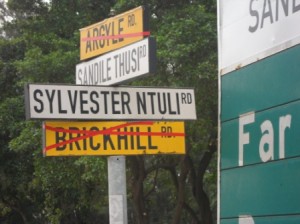
South Africa’s street signs, place names lead to more struggle
South Africa’s icons and street names continue to glorify the achievements of past white leaders. But efforts to dethrone them are meeting stiff resistance. This aired on Public Radio International and CBC Radio in May, 2010.
RACE & FOOTBALL
Racial reconciliation and the World Cup
Sports have long been divided along racial lines. Soccer, the sport watched and played by black South Africans, is being embraced by rugby and cricket-loving whites. Could this lead to reconciliation beyond the pitch? This aired on CBC Radio in June, 2010.

